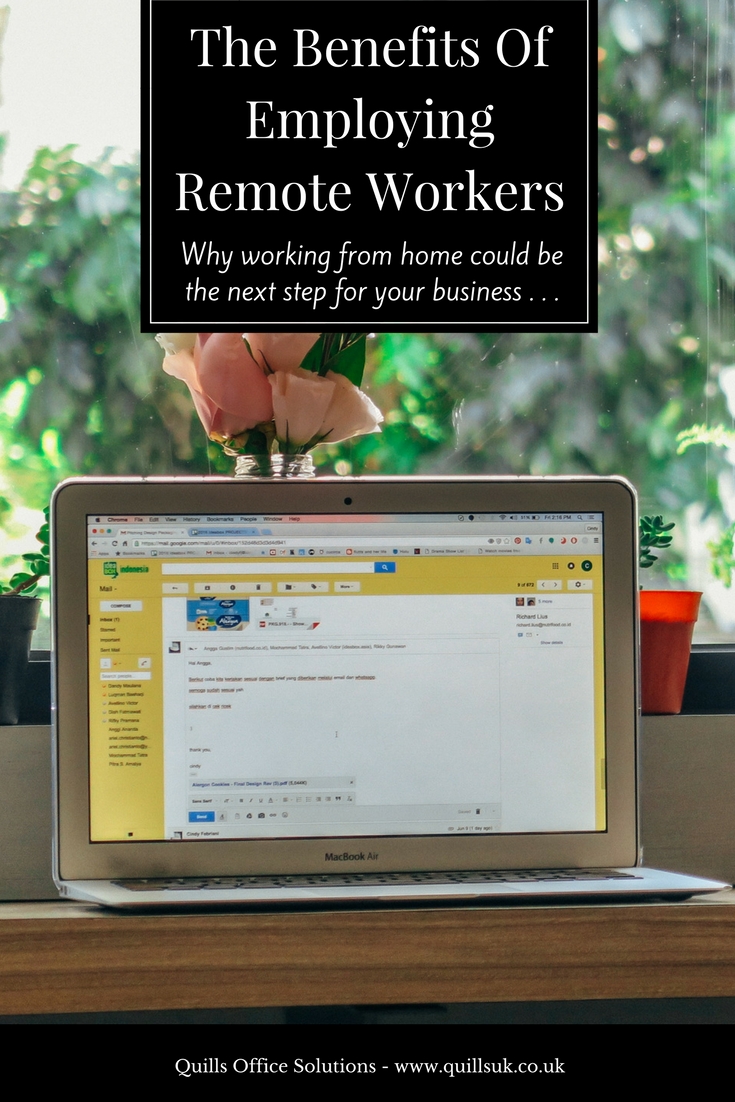Should You Let Your Employees Work From Home? The Benefits Of Remote Working
Today, we’re sharing with you the first part of our series: Should You Let Your Employees Work From Home? This series will explore the benefits of remote working (and the negatives) to help you assess whether remote workers may be the right thing for your business.
In the same style as our series about Open Offices – The Benefits Of Open Offices and The Negatives Of Open Offices – we will be writing two posts about remote working. This week’s edition is about the pros of working from home; don’t forget to return next week to learn about the negatives.
Quick summary of the BEST benefits of allowing your employees to work from home
- Increased employee retention – employees are more satisfied with their jobs and so less likely to leave.
- Lower running costs – businesses don’t need to pay for office space, commuting costs or office running costs (bills) for remote workers.
- Larger talent pool – if you aren’t limited by location, you can scout the best talent from all over the world.
- Increased employee productivity – results from employees and businesses alike have shown that employees who work from home are actually more productive.
Pros Of Working From Home
In recent years, the popularity of flexible working has risen exponentially.
In 2015, 23 percent of employees reported doing some of their work remotely
Working from home (or, as the dream goes, from a beach in the Maldives) is not just a feature of a dream job. It’s a real, tangible possibility – and it’s fast becoming commonplace. With advances in technology making it easier and easier to work remotely, more people are wanting it – and more businesses are offering it.
80% to 90% of the US workforce says they would like to work remotely at least part time.
However, is working from home just a fad? A trendy new way to attract millennial talent? Let’s take a look.
Flexibility
One of the largest benefits of remote working is the ability to be truly flexible, with both time and location. You can work from wherever, whenever is convenient for you (permitting the hours get done).
This is beneficial from a productivity perspective as some people work better at different times of day. Night-owls may do their best work long after most people have gone to sleep – and early-risers may want to take full advantage of the morning hours.
“Night-owls” and “early-risers” aren’t just character traits. Did you know that night-owls and early-risers actually have different brain structures?
Working from home allows employees to work at whatever time they perform best.
However, the flexibility of working from home is also a large benefit of remote working because it allows employees to fit work around their life – without losing work time. If an office-based employee has an appointment, they have to take off office time. In comparison, a home-based employee has an appointment, they can just move their hours around.
Improves employee satisfaction
Allowing your workers to work remotely actually increases employee satisfaction – studies have shown that remote workers are happier than their counterparts. Keeping employees satisfied is essential for retention. Plus, happier workers produce better work!
When managed correctly, improves work-life balance
There is a potential downside to working from home (from an employee perspective, at least) in that working from home can make it easier for employees to overwork. When workers are sat in the comfort of their own home, it’s easier to work extra hours – or to “just finish off this project” and end up working into the night.
However, remote working can improve the work-life balance. This ties in with the point about flexibility; if your employees need to take time for their personal lives, they can. A better work/life balance means better health and happiness – both of which mean better work.
Employees are willing to work longer hours
As previously mentioned, it can be easy for employees to overwork themselves when working from home – however, this can be beneficial if you want to contract them for longer hours.
Remote workers are usually willing to work longer hours as they are doing so from the comfort of their home.
Less sick days
Did you know that there are 64% less absent days taken from remote workers?
Think about most sick days you need to take – if your office were your home, would you be able to work? Probably. A lot of the time taking a sick day is about preventing the illness from getting worse; commuting and being around people all day are not going to help you get over a bug.
However, with remote workers, they don’t have to get up and leave their house to work – so they’re often still willing to work from home.
Saved money on transport costs
When you work in an office, you spend not only time but money on your daily commute.
If you’re one of the employers that covers your employee’s commuting costs, you can save money by allowing them to work remotely.
Good for the environment
Remember how remote workers don’t need to commute? That saves pollution caused by transport!
Saved office running costs
Running an office is expensive. If your entire workforce is office based, you’re going to be paying extra for office space, electricity and facilities – not to mention office furniture. As an employer, one of the largest benefits of remote working is that you can save money by not needing to spend it on people being in the office.
Most remote workers find they work more productively from home
Arguably the most notable benefit of remote working: most employees work better from home.
Employers tend to be mistrusting of remote working – how will you monitor your employees? How do you make sure they don’t slack off? Workers will get distracted at home – nothing will get done!
Those ideas couldn’t be further from the truth. Studies have shown that most people who work from home are more productive. In fact, 91% of remote workers consider themselves to be more productive than they were in the office.
Reduces employee stress
Imagine a workday where you didn’t have to get up and dressed at the crack of dawn to endure a long commute; where you didn’t have to leave the warmth of your home. Where you can work in the exact conditions you want. Doesn’t it sound stress-free?
Allowing your employees to work from home significantly lowers their stress levels; in turn, this increases their happiness, productivity and job satisfaction. Big win? We think so.
Gives you a wider choice of candidates
When you are open to recruiting remote workers, your talent pool widens massively. You can hire people from anywhere in the world – if the perfect candidate lives in Australia, it’s no longer an issue.
We hope this article was informative and opened your eyes to some of the benefits of working from home.










